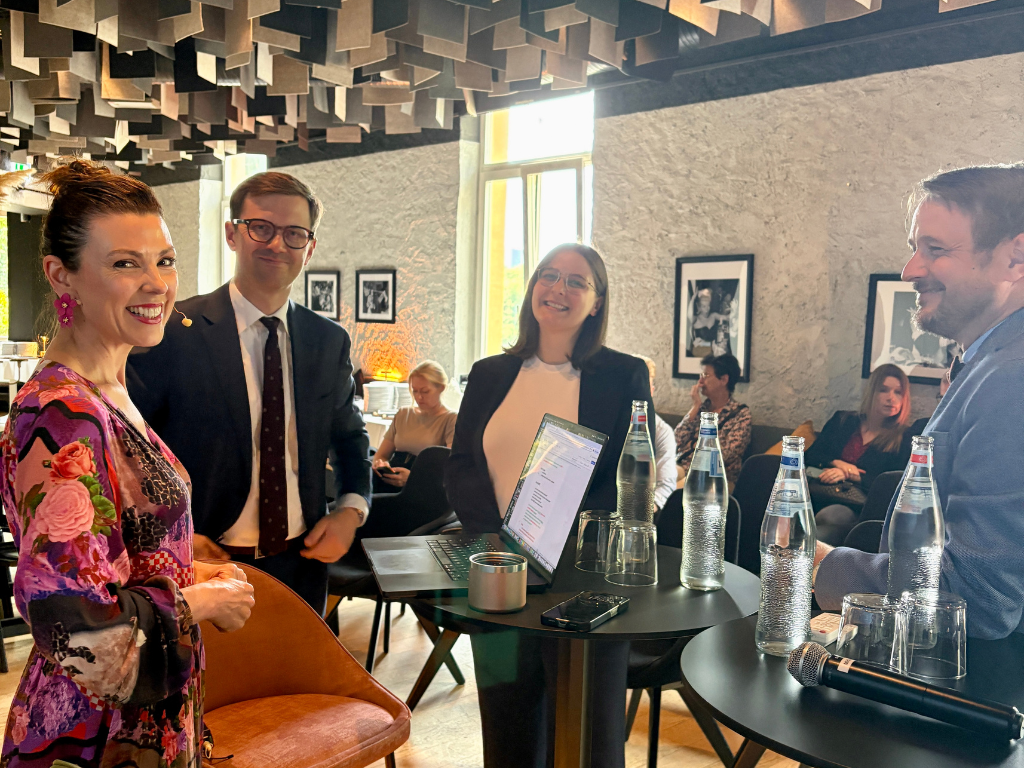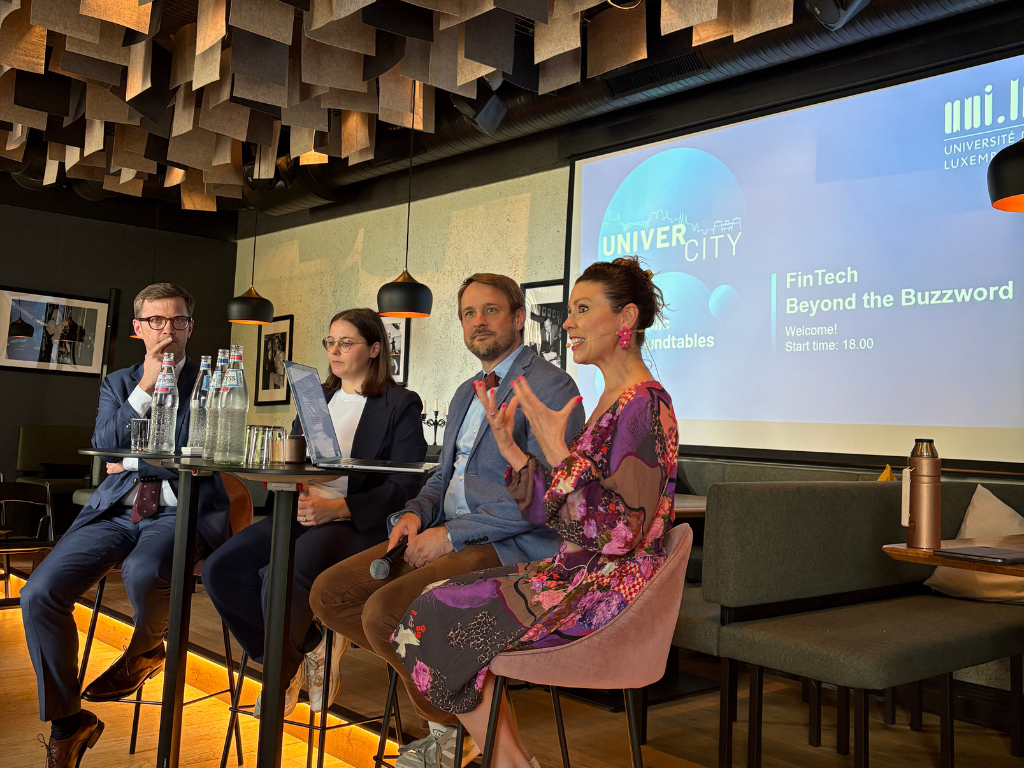AI, compliance, crypto and the digital euro – researchers unpacked the technologies transforming finance in Luxembourg and beyond.
Whether it’s tapping your phone to pay for a coffee or checking your investments via app, most of us engage with FinTech daily – often without even realising it. But behind the convenience lies a web of rapid innovation, legal complexity, and urgent questions about privacy, trust and digital identity.
At UniverCity Talks: FinTech – Beyond the Buzzword, three researchers from the University of Luxembourg explored what these changes mean – for finance, for policy, and for society. Held at Tero House 17 on 10 June 2025, the panel was part of the University’s public talk series that invites the wider community into conversation with academic experts.
Why is everyone talking about a digital euro?
Much of the discussion centred on the shift from physical to digital money. From cryptocurrencies like Bitcoin to institutional innovations such as central bank digital currencies (CBDCs), the way we use and define money is changing.
“Money is based on trust,” said Assoc. Prof Stanislaw Tosza, an expert in compliance and law enforcement. “Digital money must earn that trust in new ways.”
At the centre of the discussion was the proposed digital euro – a public digital alternative to cash currently under development by the European Central Bank. It raises important questions about privacy, accessibility, and public demand.
“It’s not about replacing cash,” explained Assist. Prof Martina Fraschini, a researcher in digital finance.
‟ It’s about giving people the option to use a digital payment tool backed by the central bank. But do we actually need it?”
Fraschini pointed to existing systems such as SEPA and TIPS – which already enable near-instant transfers – as possible alternatives. “Rather than inventing something new, we might just need to improve what we already have,” she suggested.
The panel also explored broader contrasts in FinTech design. According to Prof Gilbert Fridgen, PayPal-FNR PEARL Chair in Digital Financial Services and principal investigator of FutureFinTech, the key lies in how we trust systems.
“Bitcoin is built on trust in code,” he said. “But human institutions have handled trust reasonably well. The real question is: are we solving the right problems – or just chasing technical solutions?”
Together, the speakers highlighted two major paths in FinTech today: decentralised systems like cryptocurrencies, and institutional innovations such as CBDCs.
AI in finance: from forecasts to compliance
AI was another major theme. Fraschini described her FNR-funded research using large language models (LLMs) to analyse financial texts, such as earnings calls and news articles, to improve inflation forecasts.
“We’re not trying to replace central bank models,” she said, “but to enhance them with information they couldn’t process before. With LLMs, we can identify signals in global news that may help central banks react faster.”
Yet not all AI models deliver the expected results. Fraschini noted that “reasoning models”, designed to mimic human logic, performed no better than standard models in financial prediction – a surprising result that even OpenAI hadn’t anticipated.
The regulatory frontier
Assoc. Prof Stanislaw Tosza warned against viewing regulation as the enemy of innovation. “We don’t regulate to stop technology,” he said. “We regulate to protect people.”
He explained how compliance obligations – from anti-money laundering to upcoming EU sanctions enforcement – are rapidly expanding. AI now plays a key role in this ecosystem.
‟ AI can detect suspicious transactions better than a human analyst,” Tosza said, “but it also introduces black-box decisions. You may be flagged, and no one can tell you why.”
He cited the EU AI Act – set to take effect in August 2026 – as both a challenge and an opportunity for FinTech firms in Luxembourg. Firms using high-risk AI tools will need to act quickly to ensure compliance.
Tosza emphasised that regulation shouldn’t be seen as a brake on innovation, but as its foundation. “We can’t have innovation without responsibility,” he said, arguing that smart, adaptive regulation and thoughtful design must go hand in hand to build trust and ensure long-term success.
Skills, jobs and the human factor
Will FinTech replace jobs? Not necessarily. Fraschini was clear: “We’ll need to adapt but not vanish. AI boosts productivity – we can let it write the email, so we can focus on what matters.”
Fridgen agreed, urging attendees to build a solid grounding in technology, no matter their background. “Whether you’re in law or finance, learn the basics. Understand what tools can and can’t do.”
As for future disruptions?
‟ Some areas will transform faster than others,” said Fridgen. “Retail banking has already changed. The fund industry may be next.”
What’s next for FinTech – and Luxembourg?
Throughout the evening, one message came through clearly: Luxembourg has the tools to lead in responsible FinTech innovation – but staying ahead will require adaptability, investment, and collaboration.
Prof Gilbert Fridgen summed it up: “Innovation isn’t about chasing buzzwords. It’s about thinking differently. We can’t afford our industry being disrupted from the outside, we have to make sure to stay up-to-date ourselves.”
The panel identified four areas of real opportunity:
• AI-enhanced forecasting to support central banks and policymakers
• Digital identity infrastructure, with the EU digital wallet expected in 2026
• Process automation to streamline financial operations
• Sustainable blockchain systems, moving beyond energy-intensive mining
These developments are already shaping Luxembourg’s financial ecosystem – and they reflect the interdisciplinary approach at the heart of FutureFinTech.
Led by SnT and the Faculty of Law, Economics and Finance, FutureFinTech is the University of Luxembourg’s research initiative dedicated to understanding and guiding the transformation of financial systems. Its projects bring together researchers in law, technology, and economics to explore the real-world impacts of innovation.
FinTech isn’t just about money – it’s about how we live, how we build trust, and how we prepare for a digital future.
About FutureFinTech
FutureFinTech, founded by researchers from the Interdisciplinary Centre for Security, Reliability and Trust (SnT) and the Faculty of Law, Economics and Finance (FDEF) at the University of Luxembourg, takes a holistic approach to fintech innovation.
FutureFinTech is supported by the Luxembourg National Research Fund and the Ministry of Finance.
People in this story
Prof Gilbert FRIDGEN
Full professor in Digital Financial Services / Paypal-FNR PEARL Chair


